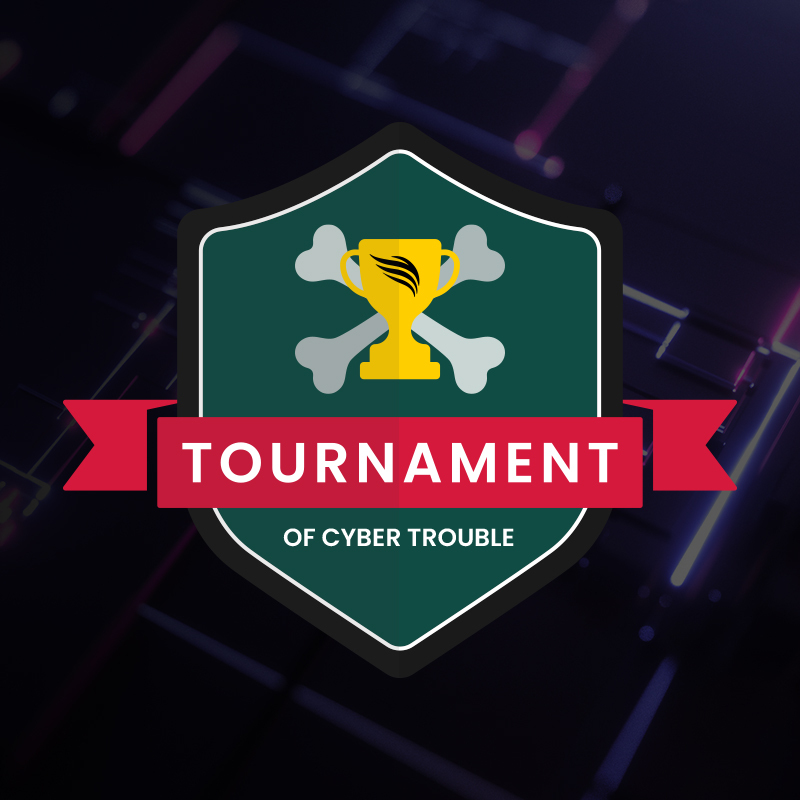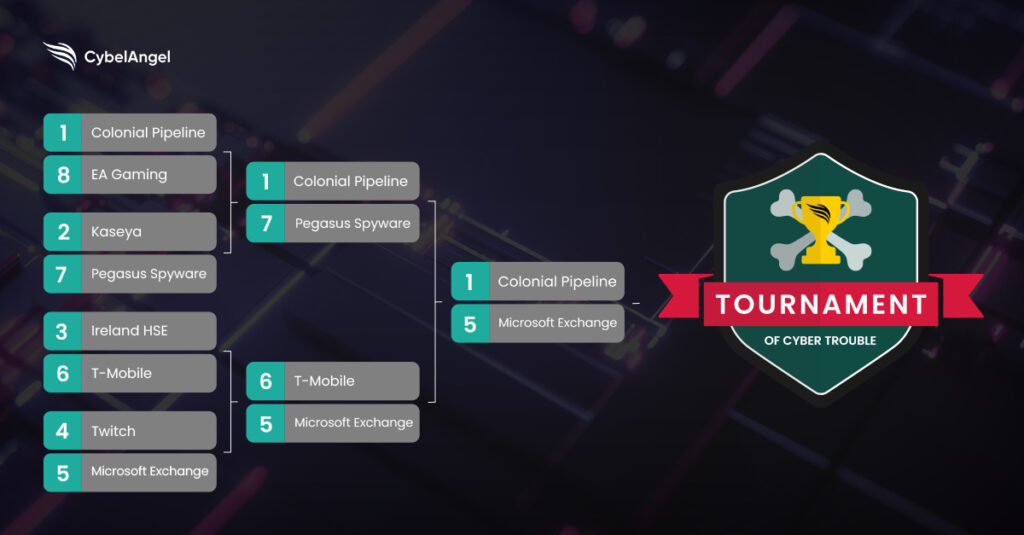
CybelAngel’s 2021 Tournament of Cyber Trouble
Updated 12/20/2021:
As 2021 comes to a close it’s time to take a look back at the biggest cyber security incidents of the year. To help sugarcoat this bitter task we’ve decided to make our year in review a bracket tournament and you decide the winner. We have chosen eight breaches covering incidents of ransomware, hacktivism, supply chain attacks, and more. The grading criteria are entirely up to you, the voter. Do you choose based solely on the number of people affected? But what about incidents that have changed the cyber security game? Who doesn’t like a clever hack where an underdog steals data out from underneath a giant company? Where do you rank cyberattacks that are so widespread they rouse the attention of a whole nation? Starting on Monday, November 29th, twice a week each Monday and Thursday at noon eastern we will let you vote on head-to-head matchups and decide which cyber incident should win. CLICK HERE TO VOTE.
And the winner of our sixth match-up is the Microsoft Exchange Hacks with 52% of the vote.
Our final match-up is Colonial Pipeline VS Microsoft Exchange Hack :
Colonial Pipeline: The Colonial Pipeline, the largest fuel pipeline in the United States, was the target of a ransomware attack. The pipeline was shut down for a total of five days leading to widespread fuel shortages along the Eastern Coast of the US. Everyday life ground to a halt in some areas as business closed, services were curtailed, and drivers were stranded for lack of fuel. Hoarding began in some locations leading to one Flordia man accidentally setting alight his H2 Hummer. Colonial Pipeline did pay a $5 million ransom to regain their data. This attack has seen multiple knock-on effects in the public and political realm. The attack is attributed to DarkSide, a Russian-speaking hacking group. Microsoft Exchange Hafnium Hacks: Hafnium a suspected China-backed hacking group infiltrated 30,000 organizations. By exploiting four newly-discovered flaws in Microsoft Exchange Server email software, Hafnium seeded hundreds of thousands of victim organizations worldwide with tools that give the attackers total, remote control over affected systems.
CLICK HERE TO VOTE
Results:
Get to Know Our Contestants:
Colonial Pipeline –
The Colonial Pipeline, the largest fuel pipeline in the United States, was the target of a ransomware attack. The pipeline was shut down for a total of five days leading to widespread fuel shortages along the Eastern Coast of the US. Everyday life ground to a halt in some areas as business closed, services were curtailed, and drivers were stranded for lack of fuel. Hoarding began in some locations leading to one Flordia man accidentally setting alight his H2 Hummer. Colonial Pipeline did pay a $5 million ransom to regain their data. This attack has seen multiple knock-on effects in the public and political realm. The attack is attributed to DarkSide, a Russian-speaking hacking group.
Microsoft Exchange Hafnium Hacks –
Hafnium a suspected China-backed hacking group infiltrated 30,000 organizations. By exploiting four newly-discovered flaws in Microsoft Exchange Server email software, Hafnium seeded hundreds of thousands of victim organizations worldwide with tools that give the attackers total, remote control over affected systems.
Ireland Health Service Executive –
Ireland’s national health service, the Health Service Executive (HSE), was the victim of a ransomware attack. Upon discovering the attack, government authorities shut down the HSE system for 45 days. The attackers utilized the Conti ransomware-as-a-service (RaaS), which is reported to be operated by a Russia-based cybercrime group.
Pegasus Spyware –
Pegasus is spyware developed by the cyber arms firm NSO Group. This spyware reportedly gives the attacker full access to the targeted smartphone. Evidence of its use was found on devices belonging to 14 heads of state, journalists, activists, and others. The sale of the “zero-click” exploit at the center of Pegasus lead to DOJ to charge three US intelligence operatives with violating International Traffic in Arms Regulations.
Kaseya –
Kaseya a managed service provider was struck with a ransomware attack leading to widespread downtime. It is estimated that between 800-1500 companies or organizations were disrupted. Three weeks after the attack and call between US President Biden and Russian President Putin, Kasyea received a universal decryptor tool from a “trusted but unnamed third party”.
T-Mobile –
Approximately 54 million people had their data exposed in this hack. The breach includes names, driver’s license numbers, Social Security numbers, and device identification (IMEI and IMSI) numbers for subscribers, former customers, and even prospective customers. The wireless carrier is reportedly facing three lawsuits that stem from the breach.
Twitch –
A hacktivism breach designed to “foster more disruption”. This breach released the entirety of Twitch’s source code, proprietary software development kits, creator payouts, and more. Notably, no user credentials have been leaked.
EA Gaming Hack –
Someone on the dark web sold an EA employee’s cookies for $10 to a hacker. Using the cookies hackers were able to gain access to a company Slack channel using social engineering to gain further access until they could steal a wealth of game source code and related internal tools. The hackers put 780GB of data including the Frostbite Engine and FIFA 21 source code up for sale, their asking price a mere $28 million dollars. Everyday CybelAngel helps companies avoid the types of cyber trouble you just read about. Our proactive approach to digital risk protection allows your company to stay on top of digital risks nipping them in the bud before the trouble even start. From Data Breach Prevention to Domain Protection and Asset Discovery and Monitoring, CybelAngel helps keep your company safe and secure. Visit our product pages to learn more.
